Unit 2 I’ll help to clean up the city parks. Section A(3a-4c) 课件(57张PPT,无音频)
文档属性
| 名称 | Unit 2 I’ll help to clean up the city parks. Section A(3a-4c) 课件(57张PPT,无音频) | 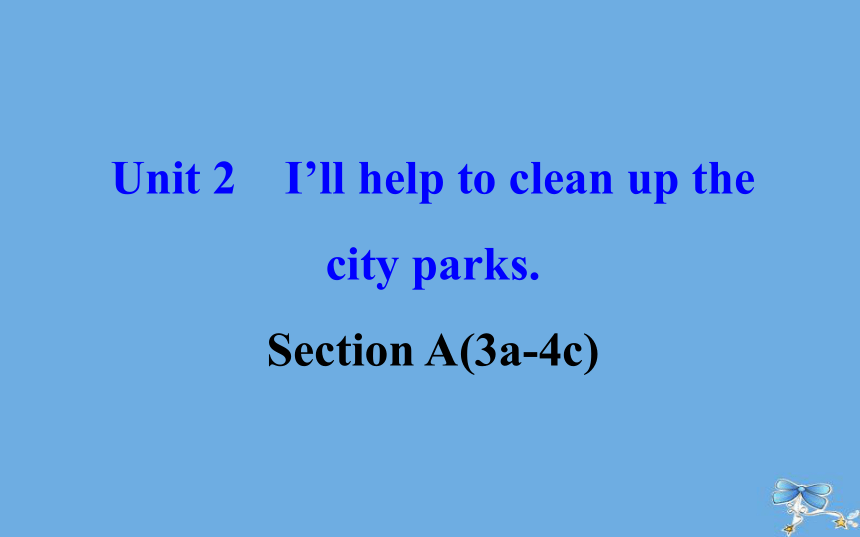 | |
| 格式 | zip | ||
| 文件大小 | 664.0KB | ||
| 资源类型 | 教案 | ||
| 版本资源 | 人教新目标(Go for it)版 | ||
| 科目 | 英语 | ||
| 更新时间 | 2020-03-11 11:57:41 | ||
图片预览


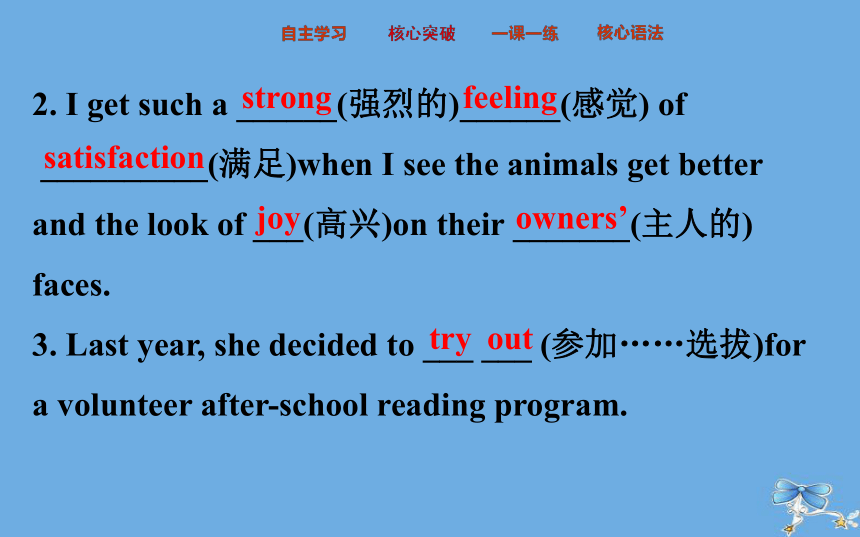
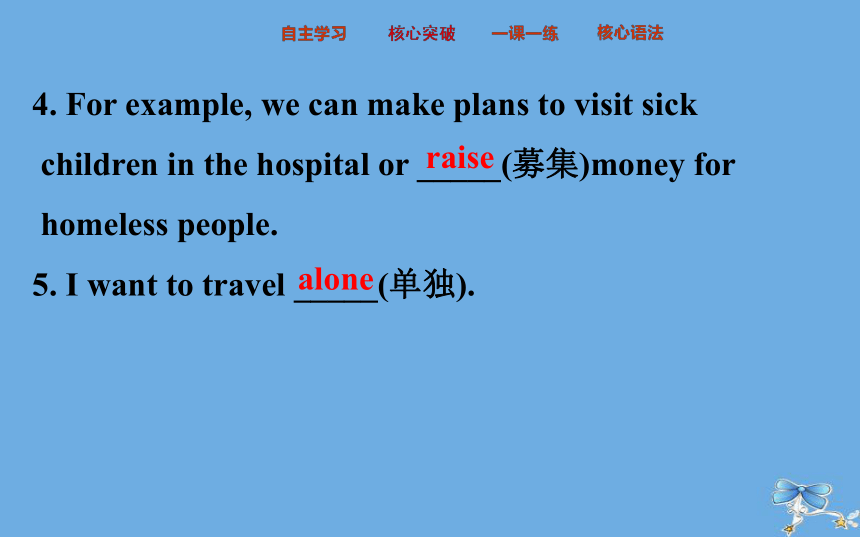
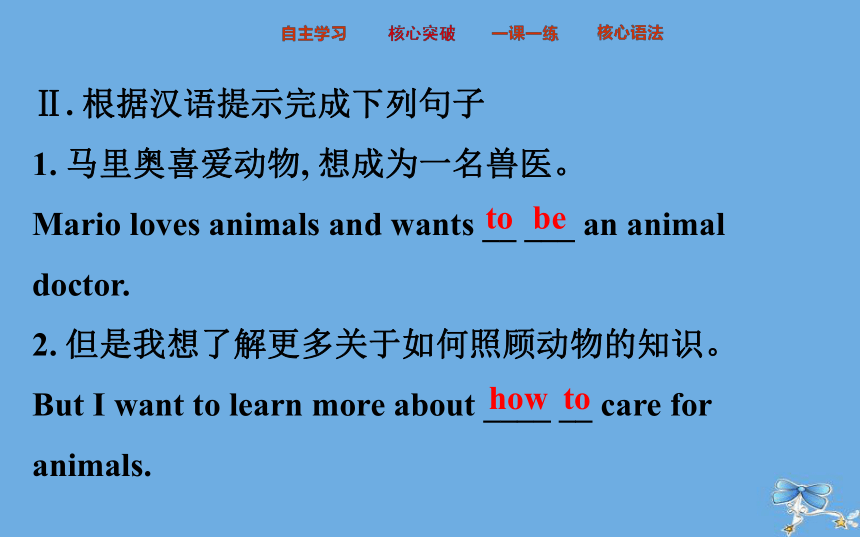
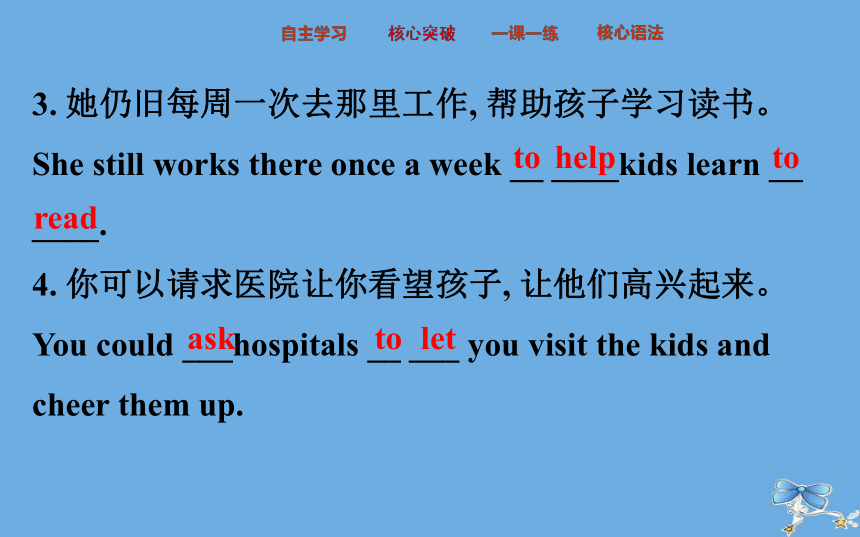

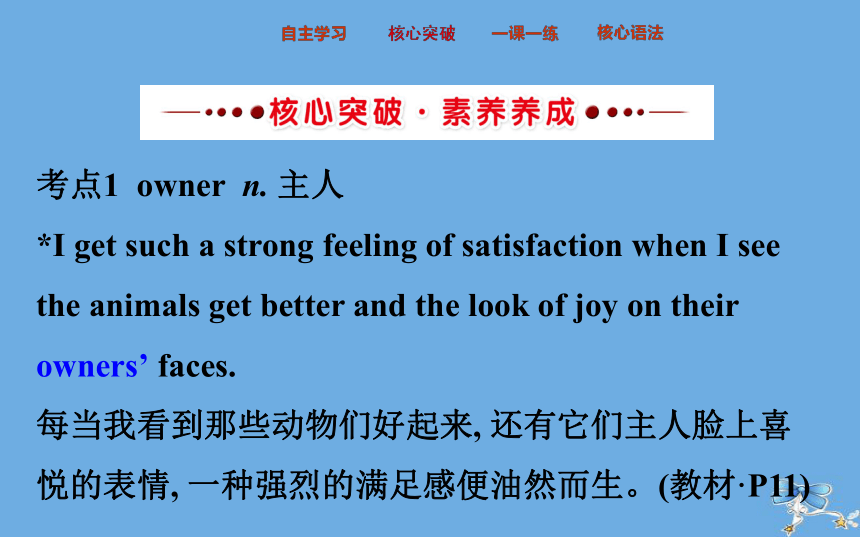
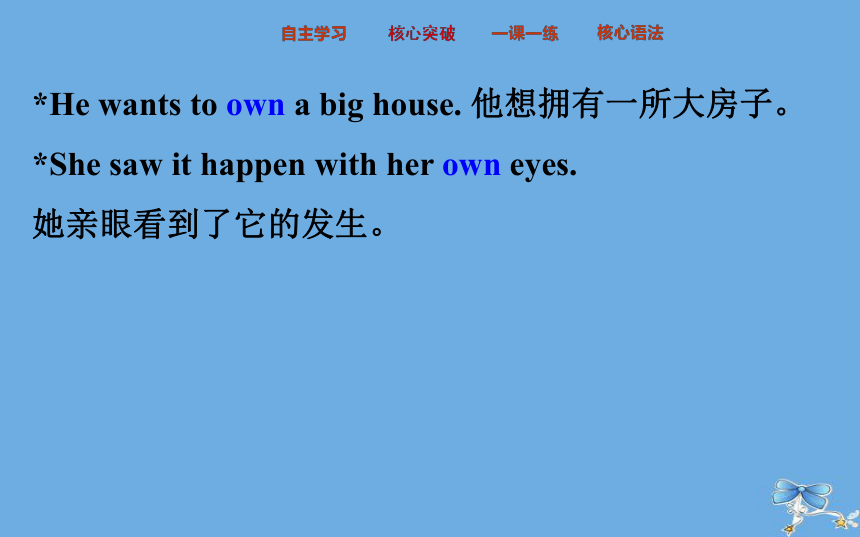
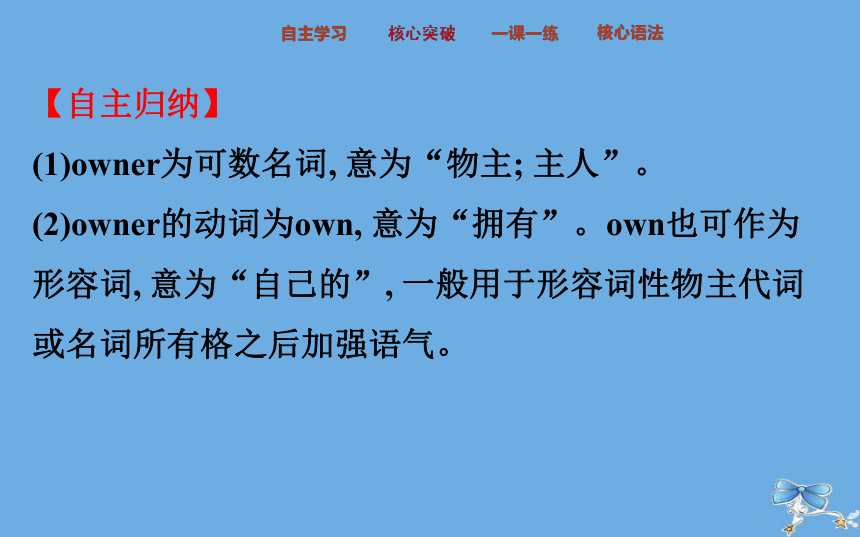
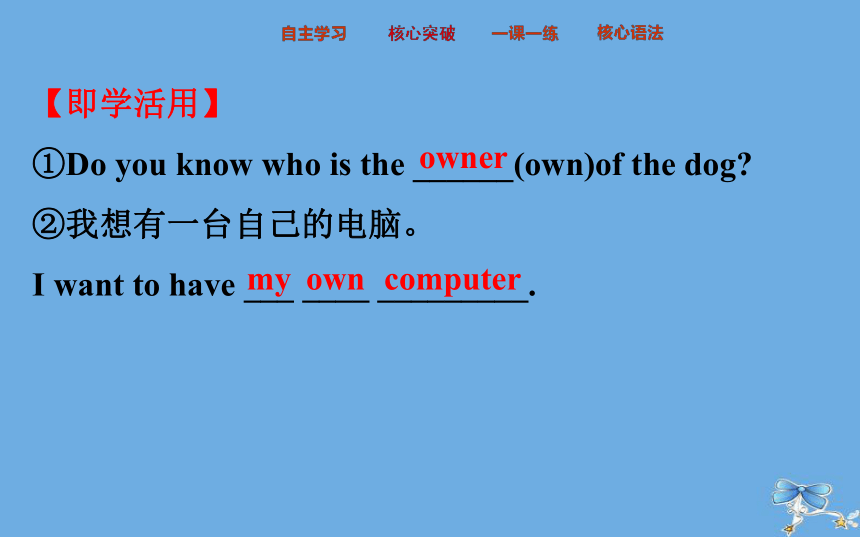
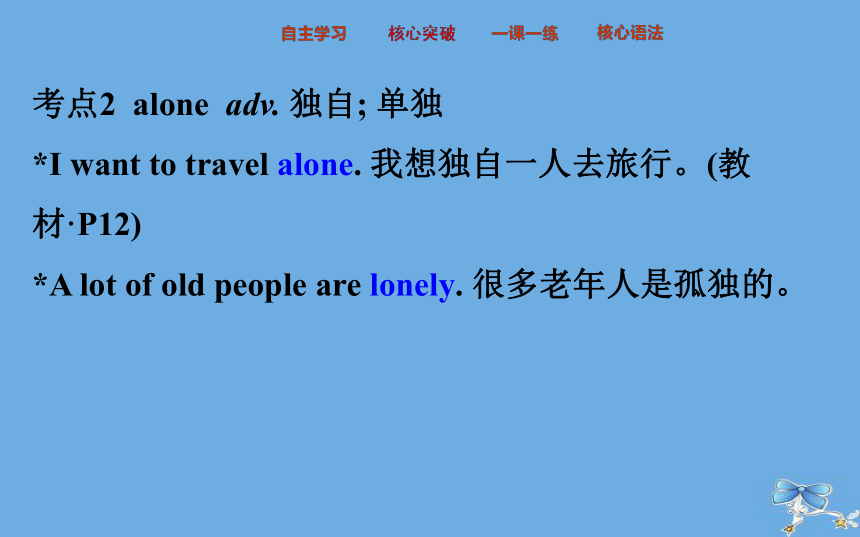
文档简介
课件57张PPT。Unit 2 I’ll help to clean up the city parks.
Section A(3a-4c)Ⅰ. 根据句意及汉语提示写出相应的单词和短语
1. Mario Green and Mary Brown from Riverside High
School give up ______(几个)hours each week to help
others. several2. I get such a ______(强烈的)______(感觉) of
__________(满足)when I see the animals get better
and the look of ___(高兴)on their _______(主人的)
faces.
3. Last year, she decided to ___ ___ (参加……选拔)for
a volunteer after-school reading program. strongfeelingsatisfactionjoyowners’tryout4. For example, we can make plans to visit sick
children in the hospital or _____(募集)money for
homeless people.
5. I want to travel _____(单独). raisealoneⅡ. 根据汉语提示完成下列句子
1. 马里奥喜爱动物, 想成为一名兽医。
Mario loves animals and wants __ ___ an animal
doctor.
2. 但是我想了解更多关于如何照顾动物的知识。
But I want to learn more about ____ __ care for
animals. tobehowto3. 她仍旧每周一次去那里工作, 帮助孩子学习读书。
She still works there once a week __ ____kids learn __
____.
4. 你可以请求医院让你看望孩子, 让他们高兴起来。
You could ___hospitals __ ___ you visit the kids and
cheer them up. tohelptoreadasktolet5. 在这儿做志愿者对我来说是梦想成真。
____________here __a dream _____ ____ for me. Volunteeringiscometrue考点1 owner n. 主人
*I get such a strong feeling of satisfaction when I see the animals get better and the look of joy on their owners’ faces.
每当我看到那些动物们好起来, 还有它们主人脸上喜悦的表情, 一种强烈的满足感便油然而生。(教材·P11)*He wants to own a big house. 他想拥有一所大房子。
*She saw it happen with her own eyes.
她亲眼看到了它的发生。【自主归纳】
(1)owner为可数名词, 意为“物主; 主人”。
(2)owner的动词为own, 意为“拥有”。own也可作为形容词, 意为“自己的”, 一般用于形容词性物主代词或名词所有格之后加强语气。【即学活用】
①Do you know who is the ______(own)of the dog?
②我想有一台自己的电脑。
I want to have ___ ____ _________. ownermyowncomputer考点2 alone adv. 独自; 单独
*I want to travel alone. 我想独自一人去旅行。(教材·P12)
*A lot of old people are lonely. 很多老年人是孤独的。【自主归纳】lonely与alone辨析【一言辨异】
I was traveling alone in the lonely mountain. I didn’t feel lonely though I was alone.
我独自在荒凉的山里旅行, 虽孤身一人, 但我并不感到寂寞。【即学活用】选词填空alone/lonely。
When you feel helpless and ______,
just remember you are not _____in the world because
your friends are around you. lonelyalone【备选要点】
考点1 several pron. &adj几个; 数个; 一些
*Mario Green and Mary Brown from Riverside High School give up several hours each week to help others.
河畔中学的马里奥·格林和玛丽·布朗每周都腾出几个小时的时间来帮助他人。(教材·P11)*He took away several of the books.
他拿走了几本书。【自主归纳】 several的两种词性
(1)several作形容词, 意为“几个的”, 修饰可数名词复数;
(2)several作代词, 意为“几个; 数个; 一些”, 既可指代人, 也可指代物。【即学活用】
①He made several _______(friend)in that company.
②你可以挑选几件衣服。
You can choose ______ __ the clothes. friendsseveralof考点2 at the age of 在……岁时
*She could read by herself at the age off our.
她在四岁的时候就能独立阅读。(教材·P11)
* He could play the piano at the age of seven.
=He could play the piano when he was seven(years old).
他七岁时就会弹钢琴。【自主归纳】
(1)“at the age of+基数词”意为“在……岁时”, 相当于when引导的时间状语从句。
(2)at the age of+基数词=at age+基数词。【即学活用】
①他在12岁时离开学校开始工作。
He left school and began work ___________twelve.
②He joined the army when he was20years old.
He joined the army __ ___ ___ __ 20. at the age ofattheageof一、动词不定式
【新知导引】
用所给动词的适当形式补全下列教材中的句子。
①I’ll help _______(clean)up the city parks.
②We could each call up10students and ask them __
_____ (come). to cleantocome③We need _______(come)up with a plan _____
(tell) people about the city park clean-up.
④I’m making some plans _______(work)in an old
people’s home this summer.
⑤Mario believes it can help him _____(get)his future
dream job.
⑥I want to learn more about how ______(care)for
animals. to cometo tellto workto getto care【知识详解】【易错警示】
(1)动词不定式(或短语)作主语或宾语时, 常用it作形式主语或形式宾语, 而动词不定式(或短语)放于后面。
(2)不定式作定语时, 若动词为不及物动词, 则须有相应的介词。例如: He has no chair to sit on. 他没有椅子坐。
(3)动词不定式作状语可以表示目的、原因和结果。作目的状语考查最多。【解题技巧】
动词不定式的解题方法:
(1)看固定搭配: 很多动词后面跟动词不定式作宾语。
(2)看句式: 例如: It’s +adj. +to do句式。
(3)一些动词后接动词不定式作宾语补足语时, 动词不定式不带to, 如see, hear, watch, notice, let, make等。【即学活用】
用所给动词的适当形式填空
1. I hope ______(visit)the beautiful park next month.
2. His job is ______(look)after the animals.
3. The best way _______(learn)is by listening to tapes.
4. Our teachers tell us ________(follow)the traffic rules. to visitto lookto learnto follow5. Good friends can make us ___(feel)happy.
6. It’s difficult ____________(understand)the passage.
7. He didn’t tell his parents where ________(travel).
8. Let’s do something ______(help)him solve the
problem. feelto understandto travelto help二、短语动词
【新知导引】
完成下列教材中的句子。
①女孩可以看望生病住院的孩子们, 让他们高兴起来。
The girl could visit the sick kids in the hospital _______
________. to cheerthem up②男孩可以在食品救助站发放食物。
The boy could _______food at the food bank.
③我们不能推迟制订计划。
We can’t ______making a plan.
④那么我放学以后分发它们。
Then I’ll _____________after school. give output offhand them out⑤我们可以张贴标识。
We could ______signs.
⑥我们应该倾听他们, 关心他们。
We should ____________and ____________. put uplisten to themcare for them⑦我们需要想出一个计划来告诉人们有关城市公园清
扫的事情。
We need to ____________a plan to tell people about
the city park clean-up.
⑧去年她决定参加课外阅读活动志愿者的选拔。
Last year, she decided to ______for a volunteer after-
school reading program. come up withtry out【知识详解】
1. 概念
短语动词是指英语中有些动词和其他词类一起连用, 构成一个固定词组, 可看成一个整体, 相当于一个单独的动词, 这种组合称之为短语动词。2. 分类及用法
(1)“动词+介词”(相当于及物动词):
常见的有: look at(看……); look for(寻找); look after(照顾); depend on(依靠); ask for(请求; 询问); agree with(同意)等。这种类型的短语后接宾语, 且宾语无论是何种形式, 一律放在介词后面。(2)“动词+副词”:
①常见的相当于及物动词的这类短语后跟宾语。宾语若为名词, 则名词常放于短语后面, 也可放在动词与副词中间; 若宾语为代词, 则只能放在动词与副词中间。
②常见的相当于不及物动词的这类短语有: get up(起床); look out(当心, 小心); run away(逃跑); hold on(稍等; 别挂断); get down(下来)等。这类短语后不跟宾语。(3)“动词+副词+介词”(相当于及物动词):
常见的这类短语动词有: look forward to(盼望); catch up with(赶上); come up to(走近); go on with(继续); run out of(用光; 耗尽); look down upon(瞧不起)等。这类短语后跟宾语, 且宾语必须放在介词后。(4)“动词+名词+介词”(相当于及物动词):
常见的这类短语有: take care of(照顾); pay attention to(注意); take part in(参加); make use of(利用); take notice of(注意)等。这类短语后跟宾语, 宾语放在介词后。(5)“系动词+形容词+介词”:
常见的这类短语有: be similar to(与……相像); be strict in/with(在……方面严格/对……严格); be familiar with(熟悉); be different from(与……不同); be full of(装满)等。这类短语要跟宾语, 宾语放在介词后。【即学活用】
1. Grandfather lives with us. We all ________him.
A. look at B. look for C. look after D. look like【解析】选C。考查动词短语辨析。句意: 爷爷和我们住在一起。我们都照顾他。look at看; look for寻找; look after照顾; look like看上去像。由句意可知选C。2. John________the TV and helped his mother with the housework.
A. turned off B. heard from
C. joined in D. looked after【解析】选A。考查动词短语辨析。turn off关上; hear from收到某人的来信; join in加入; look after照顾。由句意“约翰关掉了电视, 帮助他母亲做家务了。”可知选A。3. The bus is coming. Oh, my God! It’s full. I’m afraid we can’t________it.
A. get up B. get on C. get off
【解析】选B。考查动词短语辨析。get up“起床”, get on“上车”, get off“下车”。由语境可知, 公交车上坐满了, 恐怕我们无法上车了。故选B。4. My parents________to see In the Name of People(《人民的名义》)last weekend.
A. picked up B. stayed up
C. set up D. took up【解析】选B。考查动词短语辨析。pick up捡起, 拾起; stay up熬夜; set up建立; take up从事、开始(学习或某种爱好)。由句意“我父母上周末熬夜看《人民的名义》。”可知选B。5. It’s not a good habit to________what you can do today till tomorrow.
A. take off B. put off C. get off D. turn off
【解析】选B。考查动词短语辨析。句意: 把今天可以做的事情推到明天不是一个好习惯。take off脱下; put off推迟; get off下车; turn off关闭(电器等)。故选B。6. My mother is ill in hospital. I have to________my grandparents at home.
A. look for B. look at
C. look up D. look after
【解析】选D。考查短语辨析。look for寻找; look at看; look up(在字典中)查找; look after照顾。句意: 我母亲生病住院了。我不得不在家照顾我的祖父母。故选D。7. —You like to drink coffee, don’t you?
—Yes. But I’m ________drinking tea, too.
A. able to B. similar to C. used to D. ready to【解析】选C。考查短语辨析。be able to do能做某事; be similar to与……相似; be used to doing习惯做某事; be ready to do乐意做某事。句意: ——你喜欢喝咖啡, 对吗? ——是的。我也习惯喝茶。故选C。8.—Hi, Tina! What are you going to do for the coming summer holiday?
—I am going to ________cooking because I like eating delicious food.
A. take down B. take up
C. pick up D. clean up【解析】选B。考查动词短语辨析。句意: ——你好, 蒂娜! 即将到来的暑假你打算做什么? ——我要开始学习做饭, 因为我喜欢吃美味的食物。take down记下; take up从事、开始(学习或某种爱好); pick up拾起; clean up清扫。故选B。9. —Remember to________the lights when you leave the room.
—OK! I will.
A. turn on B. turn off
C. turn up D. turn down【解析】选B。考查动词短语辨析。句意: ——当你离开房间时记得关灯。——好的! 我会的。turn on打开; turn off关闭; turn up把(声音)调大; turn down把(声音)调小。故选B。10. Don’t put the pictures here. Please________.
A. put up them B. put them up
C. put off them D. put them off【解析】选B。考查动词短语辨析及用法。put up张贴, 举起; put off推迟, 延期。由句意“不要把这些画放在这儿, 请把它们贴起来。”可知排除C、D两项, put up是由动词和副词构成的短语, 其宾语是代词时, 代词应放于短语中间, 故选B。
Section A(3a-4c)Ⅰ. 根据句意及汉语提示写出相应的单词和短语
1. Mario Green and Mary Brown from Riverside High
School give up ______(几个)hours each week to help
others. several2. I get such a ______(强烈的)______(感觉) of
__________(满足)when I see the animals get better
and the look of ___(高兴)on their _______(主人的)
faces.
3. Last year, she decided to ___ ___ (参加……选拔)for
a volunteer after-school reading program. strongfeelingsatisfactionjoyowners’tryout4. For example, we can make plans to visit sick
children in the hospital or _____(募集)money for
homeless people.
5. I want to travel _____(单独). raisealoneⅡ. 根据汉语提示完成下列句子
1. 马里奥喜爱动物, 想成为一名兽医。
Mario loves animals and wants __ ___ an animal
doctor.
2. 但是我想了解更多关于如何照顾动物的知识。
But I want to learn more about ____ __ care for
animals. tobehowto3. 她仍旧每周一次去那里工作, 帮助孩子学习读书。
She still works there once a week __ ____kids learn __
____.
4. 你可以请求医院让你看望孩子, 让他们高兴起来。
You could ___hospitals __ ___ you visit the kids and
cheer them up. tohelptoreadasktolet5. 在这儿做志愿者对我来说是梦想成真。
____________here __a dream _____ ____ for me. Volunteeringiscometrue考点1 owner n. 主人
*I get such a strong feeling of satisfaction when I see the animals get better and the look of joy on their owners’ faces.
每当我看到那些动物们好起来, 还有它们主人脸上喜悦的表情, 一种强烈的满足感便油然而生。(教材·P11)*He wants to own a big house. 他想拥有一所大房子。
*She saw it happen with her own eyes.
她亲眼看到了它的发生。【自主归纳】
(1)owner为可数名词, 意为“物主; 主人”。
(2)owner的动词为own, 意为“拥有”。own也可作为形容词, 意为“自己的”, 一般用于形容词性物主代词或名词所有格之后加强语气。【即学活用】
①Do you know who is the ______(own)of the dog?
②我想有一台自己的电脑。
I want to have ___ ____ _________. ownermyowncomputer考点2 alone adv. 独自; 单独
*I want to travel alone. 我想独自一人去旅行。(教材·P12)
*A lot of old people are lonely. 很多老年人是孤独的。【自主归纳】lonely与alone辨析【一言辨异】
I was traveling alone in the lonely mountain. I didn’t feel lonely though I was alone.
我独自在荒凉的山里旅行, 虽孤身一人, 但我并不感到寂寞。【即学活用】选词填空alone/lonely。
When you feel helpless and ______,
just remember you are not _____in the world because
your friends are around you. lonelyalone【备选要点】
考点1 several pron. &adj几个; 数个; 一些
*Mario Green and Mary Brown from Riverside High School give up several hours each week to help others.
河畔中学的马里奥·格林和玛丽·布朗每周都腾出几个小时的时间来帮助他人。(教材·P11)*He took away several of the books.
他拿走了几本书。【自主归纳】 several的两种词性
(1)several作形容词, 意为“几个的”, 修饰可数名词复数;
(2)several作代词, 意为“几个; 数个; 一些”, 既可指代人, 也可指代物。【即学活用】
①He made several _______(friend)in that company.
②你可以挑选几件衣服。
You can choose ______ __ the clothes. friendsseveralof考点2 at the age of 在……岁时
*She could read by herself at the age off our.
她在四岁的时候就能独立阅读。(教材·P11)
* He could play the piano at the age of seven.
=He could play the piano when he was seven(years old).
他七岁时就会弹钢琴。【自主归纳】
(1)“at the age of+基数词”意为“在……岁时”, 相当于when引导的时间状语从句。
(2)at the age of+基数词=at age+基数词。【即学活用】
①他在12岁时离开学校开始工作。
He left school and began work ___________twelve.
②He joined the army when he was20years old.
He joined the army __ ___ ___ __ 20. at the age ofattheageof一、动词不定式
【新知导引】
用所给动词的适当形式补全下列教材中的句子。
①I’ll help _______(clean)up the city parks.
②We could each call up10students and ask them __
_____ (come). to cleantocome③We need _______(come)up with a plan _____
(tell) people about the city park clean-up.
④I’m making some plans _______(work)in an old
people’s home this summer.
⑤Mario believes it can help him _____(get)his future
dream job.
⑥I want to learn more about how ______(care)for
animals. to cometo tellto workto getto care【知识详解】【易错警示】
(1)动词不定式(或短语)作主语或宾语时, 常用it作形式主语或形式宾语, 而动词不定式(或短语)放于后面。
(2)不定式作定语时, 若动词为不及物动词, 则须有相应的介词。例如: He has no chair to sit on. 他没有椅子坐。
(3)动词不定式作状语可以表示目的、原因和结果。作目的状语考查最多。【解题技巧】
动词不定式的解题方法:
(1)看固定搭配: 很多动词后面跟动词不定式作宾语。
(2)看句式: 例如: It’s +adj. +to do句式。
(3)一些动词后接动词不定式作宾语补足语时, 动词不定式不带to, 如see, hear, watch, notice, let, make等。【即学活用】
用所给动词的适当形式填空
1. I hope ______(visit)the beautiful park next month.
2. His job is ______(look)after the animals.
3. The best way _______(learn)is by listening to tapes.
4. Our teachers tell us ________(follow)the traffic rules. to visitto lookto learnto follow5. Good friends can make us ___(feel)happy.
6. It’s difficult ____________(understand)the passage.
7. He didn’t tell his parents where ________(travel).
8. Let’s do something ______(help)him solve the
problem. feelto understandto travelto help二、短语动词
【新知导引】
完成下列教材中的句子。
①女孩可以看望生病住院的孩子们, 让他们高兴起来。
The girl could visit the sick kids in the hospital _______
________. to cheerthem up②男孩可以在食品救助站发放食物。
The boy could _______food at the food bank.
③我们不能推迟制订计划。
We can’t ______making a plan.
④那么我放学以后分发它们。
Then I’ll _____________after school. give output offhand them out⑤我们可以张贴标识。
We could ______signs.
⑥我们应该倾听他们, 关心他们。
We should ____________and ____________. put uplisten to themcare for them⑦我们需要想出一个计划来告诉人们有关城市公园清
扫的事情。
We need to ____________a plan to tell people about
the city park clean-up.
⑧去年她决定参加课外阅读活动志愿者的选拔。
Last year, she decided to ______for a volunteer after-
school reading program. come up withtry out【知识详解】
1. 概念
短语动词是指英语中有些动词和其他词类一起连用, 构成一个固定词组, 可看成一个整体, 相当于一个单独的动词, 这种组合称之为短语动词。2. 分类及用法
(1)“动词+介词”(相当于及物动词):
常见的有: look at(看……); look for(寻找); look after(照顾); depend on(依靠); ask for(请求; 询问); agree with(同意)等。这种类型的短语后接宾语, 且宾语无论是何种形式, 一律放在介词后面。(2)“动词+副词”:
①常见的相当于及物动词的这类短语后跟宾语。宾语若为名词, 则名词常放于短语后面, 也可放在动词与副词中间; 若宾语为代词, 则只能放在动词与副词中间。
②常见的相当于不及物动词的这类短语有: get up(起床); look out(当心, 小心); run away(逃跑); hold on(稍等; 别挂断); get down(下来)等。这类短语后不跟宾语。(3)“动词+副词+介词”(相当于及物动词):
常见的这类短语动词有: look forward to(盼望); catch up with(赶上); come up to(走近); go on with(继续); run out of(用光; 耗尽); look down upon(瞧不起)等。这类短语后跟宾语, 且宾语必须放在介词后。(4)“动词+名词+介词”(相当于及物动词):
常见的这类短语有: take care of(照顾); pay attention to(注意); take part in(参加); make use of(利用); take notice of(注意)等。这类短语后跟宾语, 宾语放在介词后。(5)“系动词+形容词+介词”:
常见的这类短语有: be similar to(与……相像); be strict in/with(在……方面严格/对……严格); be familiar with(熟悉); be different from(与……不同); be full of(装满)等。这类短语要跟宾语, 宾语放在介词后。【即学活用】
1. Grandfather lives with us. We all ________him.
A. look at B. look for C. look after D. look like【解析】选C。考查动词短语辨析。句意: 爷爷和我们住在一起。我们都照顾他。look at看; look for寻找; look after照顾; look like看上去像。由句意可知选C。2. John________the TV and helped his mother with the housework.
A. turned off B. heard from
C. joined in D. looked after【解析】选A。考查动词短语辨析。turn off关上; hear from收到某人的来信; join in加入; look after照顾。由句意“约翰关掉了电视, 帮助他母亲做家务了。”可知选A。3. The bus is coming. Oh, my God! It’s full. I’m afraid we can’t________it.
A. get up B. get on C. get off
【解析】选B。考查动词短语辨析。get up“起床”, get on“上车”, get off“下车”。由语境可知, 公交车上坐满了, 恐怕我们无法上车了。故选B。4. My parents________to see In the Name of People(《人民的名义》)last weekend.
A. picked up B. stayed up
C. set up D. took up【解析】选B。考查动词短语辨析。pick up捡起, 拾起; stay up熬夜; set up建立; take up从事、开始(学习或某种爱好)。由句意“我父母上周末熬夜看《人民的名义》。”可知选B。5. It’s not a good habit to________what you can do today till tomorrow.
A. take off B. put off C. get off D. turn off
【解析】选B。考查动词短语辨析。句意: 把今天可以做的事情推到明天不是一个好习惯。take off脱下; put off推迟; get off下车; turn off关闭(电器等)。故选B。6. My mother is ill in hospital. I have to________my grandparents at home.
A. look for B. look at
C. look up D. look after
【解析】选D。考查短语辨析。look for寻找; look at看; look up(在字典中)查找; look after照顾。句意: 我母亲生病住院了。我不得不在家照顾我的祖父母。故选D。7. —You like to drink coffee, don’t you?
—Yes. But I’m ________drinking tea, too.
A. able to B. similar to C. used to D. ready to【解析】选C。考查短语辨析。be able to do能做某事; be similar to与……相似; be used to doing习惯做某事; be ready to do乐意做某事。句意: ——你喜欢喝咖啡, 对吗? ——是的。我也习惯喝茶。故选C。8.—Hi, Tina! What are you going to do for the coming summer holiday?
—I am going to ________cooking because I like eating delicious food.
A. take down B. take up
C. pick up D. clean up【解析】选B。考查动词短语辨析。句意: ——你好, 蒂娜! 即将到来的暑假你打算做什么? ——我要开始学习做饭, 因为我喜欢吃美味的食物。take down记下; take up从事、开始(学习或某种爱好); pick up拾起; clean up清扫。故选B。9. —Remember to________the lights when you leave the room.
—OK! I will.
A. turn on B. turn off
C. turn up D. turn down【解析】选B。考查动词短语辨析。句意: ——当你离开房间时记得关灯。——好的! 我会的。turn on打开; turn off关闭; turn up把(声音)调大; turn down把(声音)调小。故选B。10. Don’t put the pictures here. Please________.
A. put up them B. put them up
C. put off them D. put them off【解析】选B。考查动词短语辨析及用法。put up张贴, 举起; put off推迟, 延期。由句意“不要把这些画放在这儿, 请把它们贴起来。”可知排除C、D两项, put up是由动词和副词构成的短语, 其宾语是代词时, 代词应放于短语中间, 故选B。
同课章节目录
- Unit 1 What's the matter?
- Section A
- Section B
- Unit 2 I'll help to clean up the city parks.
- Section A
- Section B
- Unit 3 Could you please clean your room?
- Section A
- Section B
- Unit 4 Why don't you talk to your parents?
- Section A
- Section B
- Unit 5 What were you doing when the rainstorm came
- Section A
- Section B
- Review of Units 1-5
- Unit 6 An old man tried to move the mountains.
- Section A
- Section B
- Unit 7 What's the highest mountain in the world?
- Section A
- Section B
- Unit 8 Have you read Treasure Island yet?
- Section A
- Section B
- Unit 9 Have you ever been to a museum?
- Section A
- Section B
- Unit 10 I've had this bike for three years.
- Section A
- Section B
